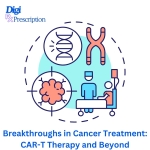introduction
Cancer treatment has evolved dramatically, moving beyond traditional methods like chemotherapy and radiation. Recent breakthroughs in cancer treatment, including CAR-T cell therapy, mRNA cancer vaccines, and precision medicine, are revolutionizing how we combat this disease. These innovative treatments are not only improving survival rates but also reducing side effects, offering hope for a future where cancer can be effectively managed or even cured.
1. CAR-T Cell Therapy: A Game-Changer in Cancer Treatment
What is CAR-T Therapy?
Chimeric Antigen Receptor T-cell (CAR-T) therapy is a type of immunotherapy that enhances a patient’s immune system to attack cancer cells. It involves genetically modifying a patient’s T cells (a type of white blood cell) to recognize and destroy cancer more effectively.
How CAR-T Therapy Works:
- T-cell Collection – Doctors extract T cells from the patient’s blood.
- Genetic Engineering – The T cells are modified in a laboratory to recognize specific cancer cells.
- Cell Expansion – The modified T cells are multiplied in large numbers.
- Reinfusion into the Patient – The engineered cells are infused back into the patient, where they hunt and destroy cancer cells.
Success Stories and FDA-Approved CAR-T Therapies:
CAR-T therapy has shown remarkable success in treating blood cancers, such as:
✅ Leukemia (FDA-approved therapy: Kymriah)
✅ Lymphoma (Yescarta, Tecartus)
✅ Multiple Myeloma (Abecma, Carvykti)
Challenges of CAR-T Therapy:
???? High Cost (up to $500,000 per treatment)
???? Side Effects (Cytokine Release Syndrome (CRS), which causes fever and inflammation)
???? Limited effectiveness against solid tumors (like lung or breast cancer)
Despite these challenges, ongoing research aims to expand CAR-T therapy to solid tumors and improve safety.
2. mRNA Cancer Vaccines: A Revolutionary Approach
How mRNA Cancer Vaccines Work
mRNA technology, which gained fame during the COVID-19 pandemic, is now being applied to cancer treatment. Unlike traditional vaccines that prevent disease, mRNA cancer vaccines train the immune system to detect and destroy cancer cells.
Key Steps in mRNA Cancer Vaccine Development:
- Tumor Analysis – Scientists identify genetic mutations unique to the patient’s cancer.
- mRNA Encoding – The vaccine is designed to instruct the body’s immune system to recognize and attack cancerous cells.
- Immune Response Activation – Once injected, the body learns to recognize the cancer markers and launches an attack.
Recent Advancements in mRNA Cancer Vaccines:
???? BioNTech and Moderna are conducting clinical trials for mRNA-based melanoma and lung cancer vaccines.
???? Personalized mRNA vaccines are being developed to prevent cancer recurrence in high-risk patients.
Challenges of mRNA Cancer Vaccines:
???? Still in clinical trial phases—mass availability may take years.
???? Requires personalized treatment, making production costly and time-consuming.
???? The immune response varies from person to person.
3. Precision Medicine: Personalized Cancer Treatment
What is Precision Medicine?
Precision medicine tailors cancer treatment to an individual’s genetic makeup, lifestyle, and tumor profile. Unlike one-size-fits-all approaches, it focuses on customized therapies based on genetic testing.
How Precision Medicine Works:
- Genetic Testing – Doctors analyze a patient’s tumor DNA to identify specific mutations.
- Targeted Therapy – Personalized drugs attack cancer-specific genes (e.g., HER2 inhibitors for breast cancer, EGFR inhibitors for lung cancer).
- Immunotherapy Combination – Precision medicine enhances the effectiveness of immunotherapies, making them more patient-specific.
Success Stories in Precision Medicine:
???? PARP Inhibitors – Targeted therapy for ovarian and breast cancer in patients with BRCA mutations.
???? Keytruda (pembrolizumab) – A groundbreaking drug used to treat lung cancer and melanoma by blocking cancer’s ability to hide from the immune system.
Challenges of Precision Medicine:
???? Requires extensive genetic testing, which is costly and not always covered by insurance.
???? Not all cancers have targetable genetic mutations.
???? Availability of specialized treatment centers is still limited.
Future of Cancer Treatment: What’s Next?
???? CRISPR Gene Editing – Scientists are exploring gene editing to repair mutations that cause cancer or enhance immune responses.
???? Nanotechnology – Tiny particles are being developed to deliver chemotherapy directly to cancer cells, reducing side effects.
???? AI in Oncology – Artificial intelligence is helping doctors analyze genetic data, detect cancer earlier, and personalize treatment plans for better outcomes.
The future of cancer treatment is rapidly evolving, and with continued research, we may soon see even more effective, accessible, and affordable therapies.
Conclusion
The battle against cancer is being transformed by CAR-T cell therapy, mRNA cancer vaccines, and precision medicine. These cutting-edge treatments are improving survival rates, reducing side effects, and offering new hope to millions of patients worldwide. While challenges remain—such as cost, accessibility, and long-term effectiveness—the progress in cancer research gives us reason to be optimistic.
What do you think about these new cancer treatments? Let us know in the comments below!
References:
- National Cancer Institute (NCI) – CAR-T Cell Therapy Overview: www.cancer.gov
- BioNTech & Moderna Research on mRNA Cancer Vaccines: www.biontech.de, www.modernatx.com
- FDA-Approved Targeted Cancer Therapies: www.fda.gov
- Precision Medicine & Genetic Testing in Cancer Treatment: www.nih.gov

